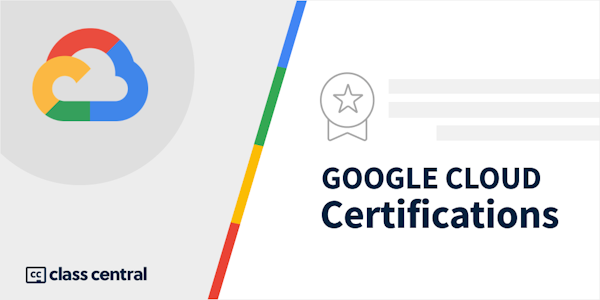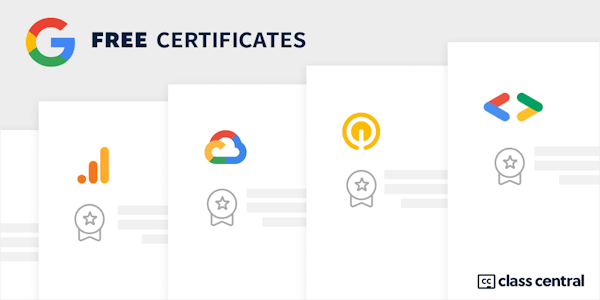Preparing for Google Cloud Certification: Machine Learning Engineer
Google Cloud and Google via Coursera Professional Certificate
Overview
87% of Google Cloud certified users feel more confident in their cloud skills. This program provides the skills you need to advance your career and provides training to support your preparation for the industry-recognized Google Cloud Professional Machine Learning Engineer certification.
Here's what you have to do
1) Complete the Preparing for Google Cloud Machine Learning Engineer Professional Certificate
2) Review other recommended resources for the Google Cloud Professional Machine Learning Engineer exam
3) Review the Professional Machine Learning Engineer exam guide
4) Complete Professional Machine Learning Engineer sample questions
5) Register for the Google Cloud certification exam (remotely or at a test center)
Applied Learning Project
This professional certificate incorporates hands-on labs using Qwiklabs platform.These hands on components will let you apply the skills you learn. Projects incorporate Google Cloud Platform products used within Qwiklabs. You will gain practical hands-on experience with the concepts explained throughout the modules.
Syllabus
Course 1: Google Cloud Big Data and Machine Learning Fundamentals
- Offered by Google Cloud. This course introduces the Google Cloud big data and machine learning products and services that support the ... Enroll for free.
Course 2: How Google does Machine Learning
- Offered by Google Cloud. This course explores what ML is and what problems it can solve. The course also discusses best practices for ... Enroll for free.
Course 3: Launching into Machine Learning
- Offered by Google Cloud. The course begins with a discussion about data: how to improve data quality and perform exploratory data analysis. ... Enroll for free.
Course 4: TensorFlow on Google Cloud
- Offered by Google Cloud. This course covers designing and building a TensorFlow input data pipeline, building ML models with TensorFlow and ... Enroll for free.
Course 5: Feature Engineering
- Offered by Google Cloud. This course explores the benefits of using Vertex AI Feature Store, how to improve the accuracy of ML models, and ... Enroll for free.
Course 6: Machine Learning in the Enterprise
- Offered by Google Cloud. This course takes a real-world approach to the ML Workflow through a case study. An ML team faces several ML ... Enroll for free.
Course 7: Production Machine Learning Systems
- Offered by Google Cloud. In this course, we dive into the components and best practices of building high-performing ML systems in production ... Enroll for free.
Course 8: Machine Learning Operations (MLOps): Getting Started
- Offered by Google Cloud. This course introduces participants to MLOps tools and best practices for deploying, evaluating, monitoring and ... Enroll for free.
Course 9: ML Pipelines on Google Cloud
- Offered by Google Cloud. In this course, you will be learning from ML Engineers and Trainers who work with the state-of-the-art development ... Enroll for free.
- Offered by Google Cloud. This course introduces the Google Cloud big data and machine learning products and services that support the ... Enroll for free.
Course 2: How Google does Machine Learning
- Offered by Google Cloud. This course explores what ML is and what problems it can solve. The course also discusses best practices for ... Enroll for free.
Course 3: Launching into Machine Learning
- Offered by Google Cloud. The course begins with a discussion about data: how to improve data quality and perform exploratory data analysis. ... Enroll for free.
Course 4: TensorFlow on Google Cloud
- Offered by Google Cloud. This course covers designing and building a TensorFlow input data pipeline, building ML models with TensorFlow and ... Enroll for free.
Course 5: Feature Engineering
- Offered by Google Cloud. This course explores the benefits of using Vertex AI Feature Store, how to improve the accuracy of ML models, and ... Enroll for free.
Course 6: Machine Learning in the Enterprise
- Offered by Google Cloud. This course takes a real-world approach to the ML Workflow through a case study. An ML team faces several ML ... Enroll for free.
Course 7: Production Machine Learning Systems
- Offered by Google Cloud. In this course, we dive into the components and best practices of building high-performing ML systems in production ... Enroll for free.
Course 8: Machine Learning Operations (MLOps): Getting Started
- Offered by Google Cloud. This course introduces participants to MLOps tools and best practices for deploying, evaluating, monitoring and ... Enroll for free.
Course 9: ML Pipelines on Google Cloud
- Offered by Google Cloud. In this course, you will be learning from ML Engineers and Trainers who work with the state-of-the-art development ... Enroll for free.
Courses
-
This course introduces the Google Cloud big data and machine learning products and services that support the data-to-AI lifecycle. It explores the processes, challenges, and benefits of building a big data pipeline and machine learning models with Vertex AI on Google Cloud.
-
This course explores what ML is and what problems it can solve. The course also discusses best practices for implementing machine learning. You’re introduced to Vertex AI, a unified platform to quickly build, train, and deploy AutoML machine learning models. The course discusses the five phases of converting a candidate use case to be driven by machine learning, and why it’s important to not skip them. The course ends with recognizing the biases that ML can amplify and how to recognize them.
-
The course begins with a discussion about data: how to improve data quality and perform exploratory data analysis. We describe Vertex AI AutoML and how to build, train, and deploy an ML model without writing a single line of code. You will understand the benefits of Big Query ML. We then discuss how to optimize a machine learning (ML) model and how generalization and sampling can help assess the quality of ML models for custom training.
-
This course takes a real-world approach to the ML Workflow through a case study. An ML team faces several ML business requirements and use cases. The team must understand the tools required for data management and governance and consider the best approach for data preprocessing. The team is presented with three options to build ML models for two use cases. The course explains why they would use AutoML, BigQuery ML, or custom training to achieve their objectives.
-
This course explores the benefits of using Vertex AI Feature Store, how to improve the accuracy of ML models, and how to find which data columns make the most useful features. This course also includes content and labs on feature engineering using BigQuery ML, Keras, and TensorFlow.
-
This course covers building ML models with TensorFlow and Keras, improving the accuracy of ML models and writing ML models for scaled use.
-
In this course, we dive into the components and best practices of building high-performing ML systems in production environments. We cover some of the most common considerations behind building these systems, e.g. static training, dynamic training, static inference, dynamic inference, distributed TensorFlow, and TPUs. This course is devoted to exploring the characteristics that make for a good ML system beyond its ability to make good predictions.
-
This course introduces participants to MLOps tools and best practices for deploying, evaluating, monitoring and operating production ML systems on Google Cloud. MLOps is a discipline focused on the deployment, testing, monitoring, and automation of ML systems in production. Machine Learning Engineering professionals use tools for continuous improvement and evaluation of deployed models. They work with (or can be) Data Scientists, who develop models, to enable velocity and rigor in deploying the best performing models. This course is primarily intended for the following participants: Data Scientists looking to quickly go from machine learning prototype to production to deliver business impact. Software Engineers looking to develop Machine Learning Engineering skills. ML Engineers who want to adopt Google Cloud for their ML production projects. >>> By enrolling in this course you agree to the Qwiklabs Terms of Service as set out in the FAQ and located at: https://qwiklabs.com/terms_of_service <<<
-
In this course, you will be learning from ML Engineers and Trainers who work with the state-of-the-art development of ML pipelines here at Google Cloud. The first few modules will cover about TensorFlow Extended (or TFX), which is Google’s production machine learning platform based on TensorFlow for management of ML pipelines and metadata. You will learn about pipeline components and pipeline orchestration with TFX. You will also learn how you can automate your pipeline through continuous integration and continuous deployment, and how to manage ML metadata. Then we will change focus to discuss how we can automate and reuse ML pipelines across multiple ML frameworks such as tensorflow, pytorch, scikit learn, and xgboost. You will also learn how to use another tool on Google Cloud, Cloud Composer, to orchestrate your continuous training pipelines. And finally, we will go over how to use MLflow for managing the complete machine learning life cycle. Please take note that this is an advanced level course and to get the most out of this course, ideally you have the following prerequisites: You have a good ML background and have been creating/deploying ML pipelines You have completed the courses in the ML with Tensorflow on GCP specialization (or at least a few courses) You have completed the MLOps Fundamentals course. >>> By enrolling in this course you agree to the Qwiklabs Terms of Service as set out in the FAQ and located at: https://qwiklabs.com/terms_of_service <<<
Taught by
Google Cloud Training







